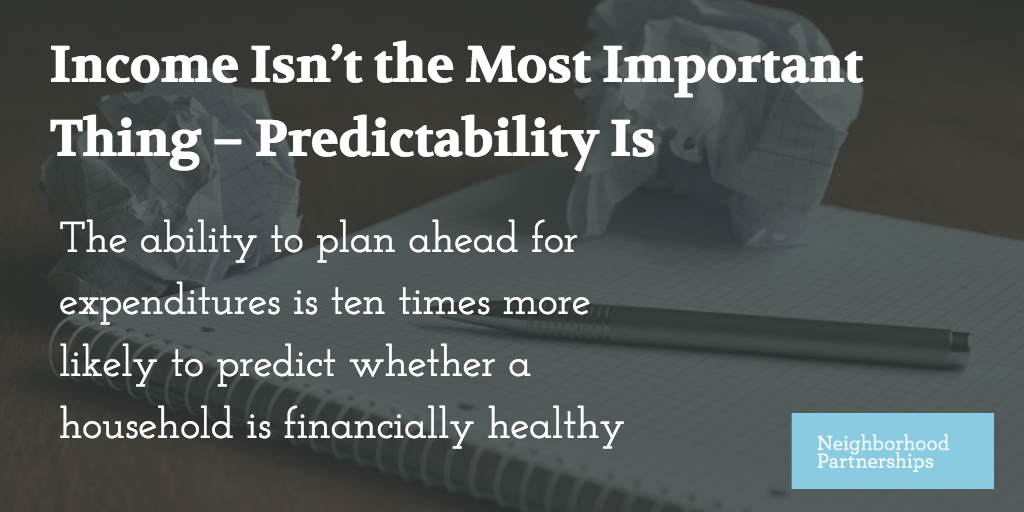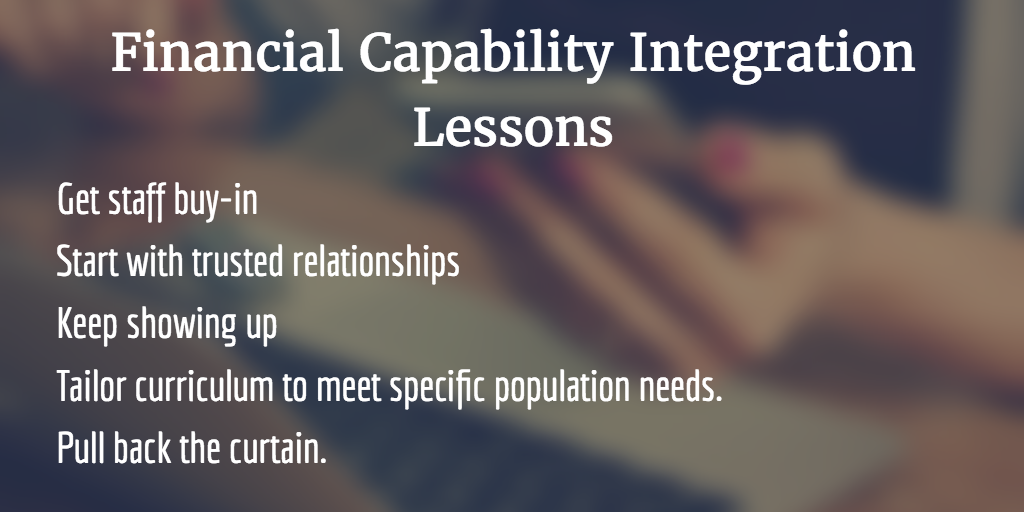“It’s about honoring the complexity of the experience of people living in poverty, instead of trying to address needs in isolation.” – Brendon Basset, Metropolitan Family Service.
 What does it takes to increase the financial resilience of our communities and the people we serve?
What does it takes to increase the financial resilience of our communities and the people we serve?
In June, Executive Director Janet Byrd and Financial Innovations Director Jill Winsor have been on a journey to find out. From Lane County, OR for our first Regional Asset Building Summit to Minneapolis, MN for the CFED Integration Lessons Learned Summit, we heard from some leading minds and inspiring partners. The problem and answers are complex. But there is a path forward.
Context Shapes Financial Conditions
In Eugene on June 7th and 8th we held our inaugural Regional Asset Building Summit in Lane County, with our many co-sponsors including the City of Eugene, United Way of Lane County, NEDCO, ShelterCare, Oregon Department of Consumer & Business Services, JP Morgan Chase, and Bank On Oregon.
We looked at the financial conditions impacting community members and shared what we know about how that context shapes their experience. Additionally, our network of partners shared what they are doing in the region to build financial skills, resilience, and capability.
Oregonians – like many in the U.S. – Are Financially Strapped
Lane County residents, like people in all parts of Oregon and across the country, are financially strapped. We know that more than half of households nationwide could not come up with $400 to pay an unexpected expense without borrowing something or selling something (quoted in What It’s Worth, p 6). ALICE, or Assets Limited, Income Constrained, Employed, is an acronym that describes individuals and families who earn more than the U.S. Federal Poverty level but less than the basic cost of living. Research conducted in Lane County into the experience of people identified as “ALICE” indicates that more than 4 out of ten residents are at or below the ALICE threshold (making less than what has been calculated to just make ends meet in Lane County).
But Income Isn’t the Most Important Thing – Predictability Is
Unless people are making very high incomes, income is not the primary determinant of whether people are financially striving or thriving.
According to research by the Center for Financial Services Innovation (Understanding and Improving Consumer Financial Health in America, p.22), the ability to plan ahead for expenditures is ten times more likely to predict whether a household is financially healthy, holding all other variables constant. The habit of making a budget is four times more likely to predict financial health. But, research (US Financial Diaries – USFD —http://www.usfinancialdiaries.org/) also proves that household incomes are getting more and more unpredictable. Income variations from month to month are now the rule rather than the exception for well over half of households. As we’ve seen in the Oregon IDA Initiative for years, planning ahead and making and keeping a budget require both skill and strong habits.
Lastly, when asked whether “financial stability” or “moving up the income ladder” is more important, 77% of USFD participants chose “financial stability.” This response illustrates the high level of financial uncertainty and unpredictability that these households face.” (US Financial Diaries, Issues Brief, Spikes and Dips )
Useful Tools for Building Financial Capability
Your Money Your Goals is an Invaluable Free Toolkit for Providers
On the second day of our Regional Asset Building Summit, June 8th, Elena Fracchia of Pacific Continental Bank (and an NP Board member) trained 30 people to take the Consumer Financial Protection Bureau’s Your Money Your Goals Toolkit back to their organizations to help staff feel more capable of having financial conversations with clients.
National Financial Capability Integration Helps Reinforce Skills and Habits
The bulk of our time at the Regional Asset Building Summit and this week at the CFED meetings was focused on what we can do to help increase these skills and create and reinforce habits. Besides being what research says we should do, we know this is what people say they want
The key take-aways from the CFED Integration summit were shared by all of the organizations who participated in the cohort.
- Get staff buy-in. We could all use support to increase our own sense of financial well-being. Integration Cohort participants found that when they helped staff take steps to increase their own financial capability, it was much easier to ask staff to turn around and do this work with clients. This lesson reaffirms the central intention of the Your Money, Your Goals toolkit, to increase service provider comfort engaging in conversations related to financial well-being.
- Start with trusted relationships. Whether an organization is partnering with external entities or working to integrate across departments, working with people who have established trust with clients took the work a lot further a lot faster.
- Keep showing up. If your organization is bringing financial coaching or education into a new space, even if that trusted relationship exists between the clients and your partner organization, it will take time before that trust is shared with you. You might not have anyone participate in drop-in financial counseling the first time, or even the 5th time, but if you keep showing up and become a familiar face, you just might find yourself with a full schedule.
- Tailor curriculum to meet specific population needs. This is important: it’s not actually about tailoring the content as much as it is about tailoring the format in which the content is offered. The process of pulling a credit report fairly universal, but the way we provide that lesson should be responsive to specific community needs. What sort of activity will be engaging for youth or for survivors of domestic violence? What key concerns or issues should you mention when talking to African American or Native communities? And let’s remember, none of us need a lecture, so how can we tailor curriculum to be interactive and meaningful?
- Pull back the curtain. Plan a field trip to a financial institution! Is there a credit union in your community that specializes in providing services to people lacking documentation of citizenship? Demystify the process and introduce clients to local institutions you trust.
We Can Apply These Lessons In Oregon
We also heard about some really exciting and innovative projects that we’d love to see brought to Oregon.
- CAP Services in Wisconsin has launched, “Pay Down, Save Up,” a debt management program incentivized with a monetary match.
- Financial Guidance Center in Las Vegas, Nevada, has a post-home-buying class in partnership with Lowe’s where, after a client has purchased a home, they learn how to maintain their mortgage and also learn some DIY skills to physically maintain their home. Participation is incentivized with a $50 Lowe’s gift card.
NeighborImpact of Central Oregon and Metropolitan Family Service shared their successes and learning about how to integrate financial capability work into service delivery and educational programs. They launched their work using CFEDs Financial Capability Integration Toolkit, and are willing to help us think about how to help all of our Oregon partners move this work forward.
We have to admit; a highlight of the event was the screening of CFED’s video describing the importance of Financial Capability Integration. We were pleasantly surprised that the video exclusively featured our Oregon partners Metropolitan Family Service, Innovative Changes and Home Forward! Shout outs to Brendon Basset (MFS), Mark Oliver (MFS), Nancy Yuill (IC$), Stephanie Sampedro (IC$), Landra Glover (IC$), Michael Buonocore (HF) and Nasir Idrees (HF), you all looked great! RE:Conference attendees can look forward to seeing the video in November!


